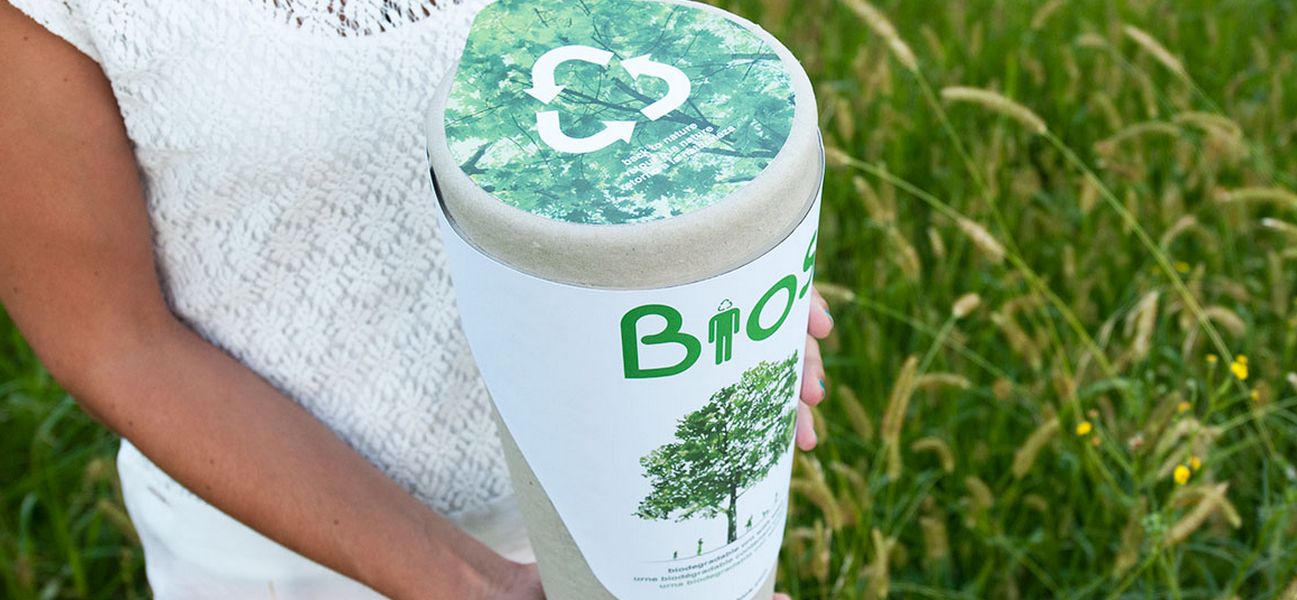Ten Eco-Friendly Funeral Ideas
Greener lives are increasingly being followed by eco-deaths. Here are ten tips on how to plan an ethical send off:
Fancy meeting your maker wrapped up in banana leaf, burying your loved one in a woollen eco-coffin or watching your pet’s ashes grow into a rosebush? For anyone interested in living a greener lifestyle, it’s time to start thinking about your death-style too.
Writing about ethical death is not easy. Some reading this may even be offended at the notion of the green reaper. But with world population now over seven billion and an estimated 150,000 deaths globally per day, it’s time we took the environmental impacts of death a little more seriously. With that in mind, here are 10 top tips for a greener journey’s end:
1. Grief balls
Cremation is not a particularly sustainable way to go, but if that’s the way you choose, why not ensure your ashes are turned into something environmentally beneficial? Take Eternal Reefs, for example, which transforms cremated remains into artificial coral reefs or ‘reef balls’ to support marine life at a time when traditional reefs are undergoing significant deterioration.
2. Cut the gas
Dealing with ashes aside, an alternative to cremation comes in the form of resomation, which uses alkaline hydrolysis instead of fire to break down the body chemically, reducing a funeral’s greenhouse gas emissions by approximately 35%, according to Sustain. The sterile, DNA-free liquid that results is returned to the water cycle while the accompanying bone ash remains go in an urn to give to loved ones. The process needs to be regulated before it can take place, it is currently available in some US states and the company is awaiting the outcome of an approach to the UK government.
3. Urning your eco credits
Talking of urns, Bios Urn has created a fantastic, biodegradable urn, designed to host a tree seed. Once the urn is buried, the tree begins to grow, the urn then decomposes, and eventually the entire structure becomes part of the sub-soil and fertiliser for the tree.
4. Ashes to ashes, dust to… water hyacinth
The rapidly growing market for bio-degradable coffins goes hand in hand with the rise in different materials available for burial. In Britain, wicker and cardboard remain the most common alternatives, but everything from banana leaf and water hyacinth to bamboo is now used. Wool too is rising in popularity – Hainsworth, one of the UK’s leading textile mills, reported a 700% rise in demand for its woollen coffins in 2011 to 2012.
5. Wood you believe it?
For those keen to stick to more traditional coffins, you don’t have to resort to mahogany, which is often used to make high-end wood caskets despite the fact that it comes from an endangered rainforest tree. Instead, it’s possible to opt for coffins made from sustainably sourced wood, such as the Reflections coffin, which is made from 80% waste wood and 20% FSC-certified wood, with a biodegradable cotton lining.
6. Meat-free meets
The immediate few days following someone’s death are often a complicated mix of mourning and practicalities; the eco possibilities for the latter are endless. For a start, plump for a meat-free wake. Even better, try and use locally sourced ingredients – a feast awaits you on your doorstep if you know where to look. A handy place to start is a localfood directory, and tap into the microbrewery world for a top eco tipple.
7. Flower power
It’s common to send flowers to the bereaved. As thoughtful as this gesture is, cut flowers come at a high environmental price. One option is to ask for an ‘in lieu of flowers’ option at your funeral, with donations instead going to an eco-minded charity of your choice. Even without a specific request, there’s nothing stopping friends and family sending an alternative to a floral arrangement: a plant or tree that will live on; a self-care voucher for someone in mourning; or something practical like taking a few meals to the bereaved – at such a difficult time, small gestures of friendship can make all the difference.
8. Sharing rides
If you’re sending out invitations, it makes sense to encourage guests to offer one another lifts or use a website like GoCarShare to share a low-cost lift with a driver going in that direction anyway. If people have far to travel, follow the “train beats plane” rule when you can and keep that carbon footprint down.
9. Eco house clearing
For those dealing with whatever’s been left behind after the execution of the will, projects such as Streetbank and Community RePaint are there to rehome the things you no longer need, helping strengthen communities in the process. If you need to spruce up a home before selling it on, Ecover range of environmentally-friendly products andEcozone’s eco-balls are a winning combination.
10. If all else fails, turn yourself into vinyl
Some choose to leave an environmental legacy in their wills. Others, however, may go a little off piste. For music lovers, for example, there’s an option to have your remains pressed into a vinyl with And Vinyly, which offers “a range of packages for people, parts of people and pets”. Not convinced? Check out their homepage blurb: ‘When the album that is life finally reaches the end, wouldn’t it be nice to keep that record spinning for eternity?’ It might not be the greenest option on here, but if you’ve managed to tick off all of the above …
• This article was amended on 18 March to include the sentence: The process needs to be regulated before it can take place, it is currently available in some US states and the company is awaiting the outcome of an approach to the UK government.
This content is brought to you by Guardian Professional.




